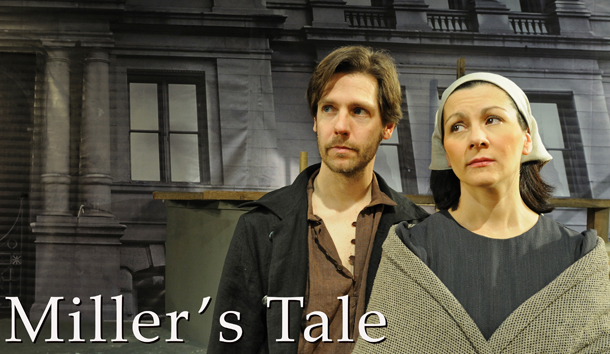 |
| Carolyn Baeumler and Catherine Eaton get to know each other in The Exceptionals. |
What do you do when your best parenting instincts prod you toward a vision of eugenics that the Third Reich might have approved?
That's the queasy question posed by Bob Clyman's The Exceptionals, at the Merrimack Rep for just one more week. Or rather that's the question that's almost posed by The Exceptionals - the playwright tiptoes up to it but isn't quite sure how to seal the deal on that troubling proposition. And with good reason - he's clearly leery of letting his clever play slide toward the pulpy territory of, say, The Boys from Brazil or They Saved Hitler's Brain.
But Clyman doesn't even go as far as, say, Brave New World, and that means his play somehow feels as if it's still in development (we can sense its thematic conclusion is simply missing). The Exceptionals is still pretty exceptional, though - it's certainly the most interesting political play I've seen in some time, and glints with a dismayed, yet sympathetic, sense of comedy in Charles Towers's smoothly disturbing production. Clyman's deep insight is that with the new capabilities of our fertility clinics, a vision of a master race can rise just as easily out of Parenting Today as it once did out of Mein Kampf - and the Merrimack cast (and particularly the gently manipulative Judith Lightfoot Clarke) capably put over that idea as implication if not statement.
Clyman's conceit is at first glance utterly believable - a huge "longitudinal" study is underway of very intelligent women who have sought out equally intelligent sperm donors at a gleaming new fertility clinic (that kind of match-up goes on all the time, even now; I think there's actually a list of Nobel-prize-winning sperm donors available to serious IQ-climbers). At the start of The Exceptionals, two very opposed women have met at the clinic to discuss with the staff counselor Claire (Lightfoot Clarke) the futures of their two gifted offspring. Gwen (Carolyn Baeumler) is a tense striver; Allie (Catherine Eaton) a more laid-back slummer - a woman who, perhaps out of affection for her blue-collar roots, has never "made good" on the promise of her potential, but instead prefers to kick back with a paperback by Danielle Steele. Gwen has no husband; Allie has an infertile, "average" one (Joseph Tisa) - a nice guy who's already uncomfortable with just how bright his kid has turned out to be (he's doing quadratic equations in kindergarten; already Dad can't help with the homework).
As the play progresses, however, these parents' wishes slowly take a back seat to the clinic's wishes - and those of its unseen director, "Dr. Vorsiff" - and we begin to perceive a creepy, unspoken agenda operating behind the frosted glass and floral arrangements of these sleekly appointed digs (perfectly realized by designer Judy Gailen, btw). Said agenda includes slowly separating little "Ethan" and "Michael" from their respective parents and enrolling them in a 24/7 program that will ensure their full intellectual bloom, like "beautiful roses," as Claire coos to the audience. This horrifies both mothers, to be sure; but if making sure your child got the very best meant he or she had to join the Hitler Youth Boarding School - well, what would you do?
Alas, so far playwright Clyman only hints at this underlying social issue, when I'm afraid it's basically the end-game of his whole set-up (he has to face it - albeit very delicately - to do his own concept justice). Right now the author instead spins his wheels a bit on the question of fatherlessness (for both mother and child) - a poignant and rewarding dramatic subject, to be sure, and one about half his audience no doubt relates to intensely; obviously the culture is already edging toward the obsolescence of the father. But what happens when even the mother becomes superfluous - when the paternal corporation in effect becomes the gifted child's only parent? I kept wishing Clyman could lead his heroines (or anti-heroines) to a deeper awareness of what, exactly, they might be participating in; instead, he keeps the political personal (and so limits the horizon of his play). Only Claire, appropriately enough, sees things clearly (below) - she's well aware that as her clinic succeeds, and more and more women opt for higher IQs for their children, the less-intellectually-endowed will inevitably fall further and further behind. She sees this as "evolution" - but evolution toward what, exactly, she prefers not to say.
 |
| Only Judith Lightfoot Clarke's "Claire" can really see what's coming in The Exceptionals. |
Right now, I'd argue Claire's internal conflicts all but cry out for more development - still, Judith Lightfoot Clarke makes the most of her subtle cries for help. As the driven Gwen, Carolyn Baeumler is herself a bit forced at first, but by the finale was deeply touching as she found herself required to sacrifice everything for the sake of little Ethan. Meanwhile the hearty, likable Catherine Eaton was at times almost a shade too laid-back as Allie - we missed the watchful wit that must lurk behind her "what-the-hell" attitude. These are but quibbles, however, in what amounted to an excellent ensemble - which ably conveyed Clyman's vision of the "not-too-distant" future. That is, if it's distant at all.




















